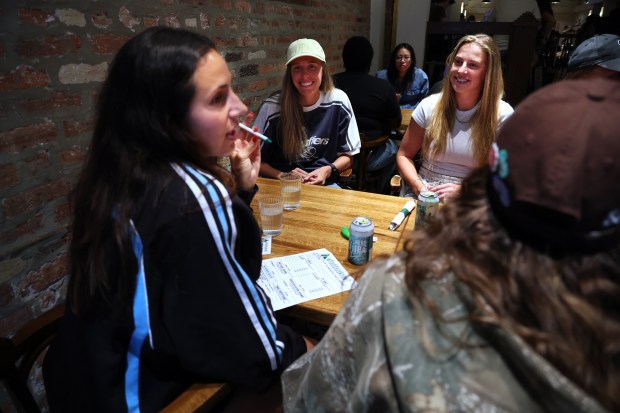Pro-Palestine protests continued for a second day Friday at Northwestern’s Evanston campus, with hundreds of students and faculty — many of whom spent the night in tents — pressuring the university to divest from funds connected to Israel or those that profit from its war in Gaza.
Students and activists associated with the Northwestern Divestment Coalition started the “Northwestern Liberation Zone” Thursday morning at Deering Meadow, a popular common area on campus. By Friday morning, more than 40 tents covered the encampment — three times as many from the day before — along with a medic tent, kitchen canopy and a handful of lawn chairs.
Signs taped to the fence surrounding the protest contained messages such as “All eyes on Gaza,” while some organizers trained protestors on what to do if they’re arrested. No police were seen near the demonstration.
Protest encampments have popped up at dozens of college campuses across the U.S. and Canada, including Loyola University in Rogers Park, after beginning at New York’s Columbia University last week. Some schools have negotiated with students, while others called in law enforcement to douse demonstrations, leading to mass arrests and, at times, violent clashes with police officers.
As the death toll mounts in the war in Gaza — more than 34,000 Palestinians have been killed in the war, according to the Health Ministry — and the humanitarian crisis worsens, students have demanded schools cut financial ties to Israel. Private institutions like Northwestern aren’t required to provide detailed financial information.
Some Jewish students say the protests have made them afraid to set foot on campus. Northwestern Hillel, the university’s Jewish center, said the encampment reflected “a disturbing and quickly escalating trend of antisemitic rhetoric and actions both nationally and on our own campus.”
On Thursday, Northwestern administrators abruptly changed campus policies to ban tents and other temporary structures in common areas. Students in violation of the new policy risked suspension, expulsion or criminal charges, according to a statement posted on the university’s website.
There were some encounters between students and police at the encampment. Cops warned students Thursday morning to take down their tents or be cited for breaking school policy, but eventually left to monitor the protest from nearby buildings. No citations had been issued as of Thursday afternoon, a campus spokesperson said.
“The goal of this addendum is to balance the right to peacefully demonstrate with our goal to protect our community, to avoid disruptions to instruction and to ensure University operations can continue unabated,” Northwestern President Michael Schill said in an email.
Senior administrators met with demonstrators Thursday evening to “ensure the safety of members of the Northwestern community while also providing a space for free expression,” a university spokesperson told the Tribune. The university told students they could continue to assemble as long as they remove tents and stop using bullhorns and speakers, an offer they declined, a statement posted to the school’s website said.
At a protest Thursday afternoon, roughly four dozen Loyola University students called on the school to reinstate a student representative to its board of trustees so students can access the school’s financial portfolios and understand whether it has invested money with companies that profit from war. Campus security watched the sit-in from a distance, but did not attempt to stop it.
A protest is planned for Friday afternoon at the University of Chicago.
Contributed reporting from the Associated Press.




